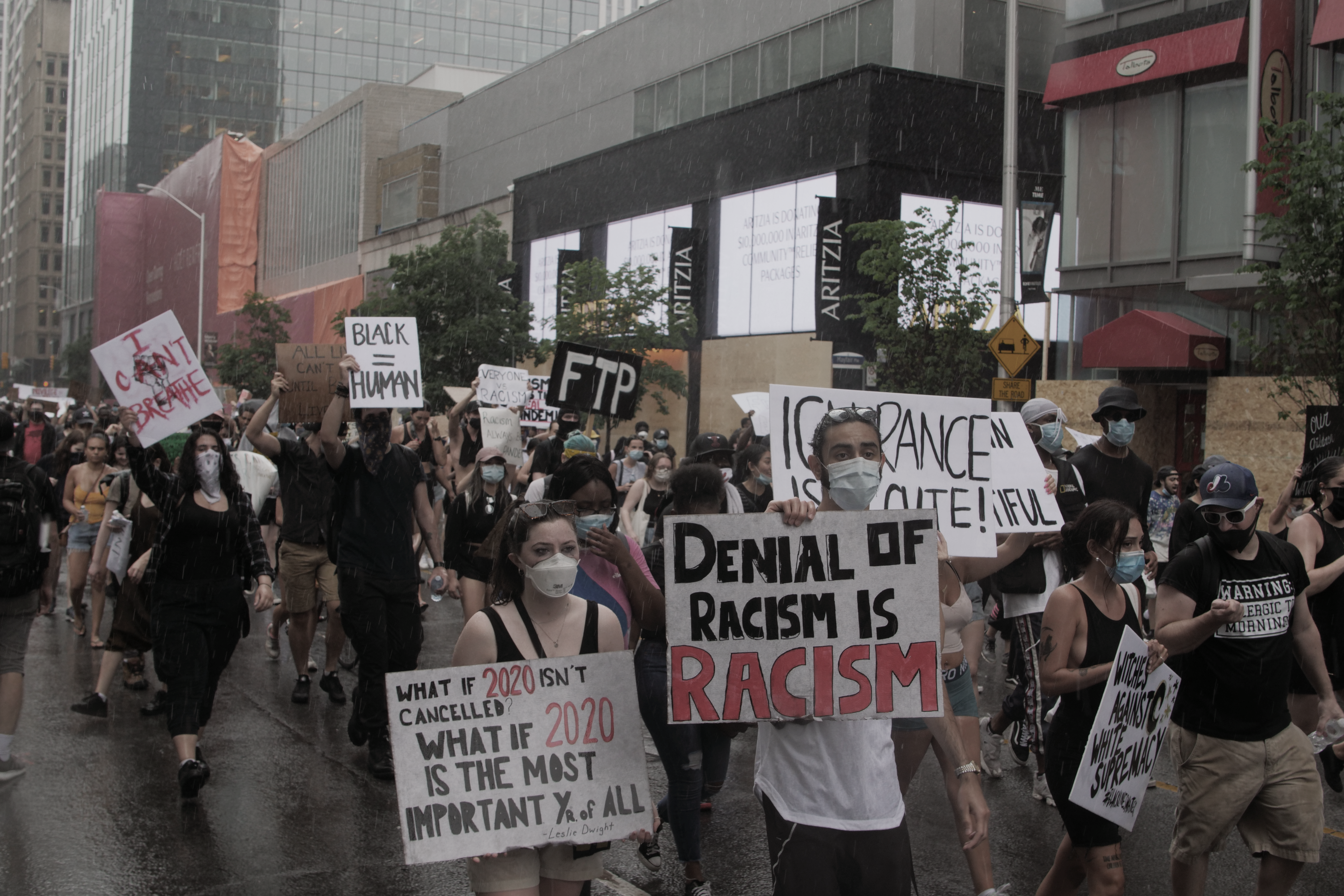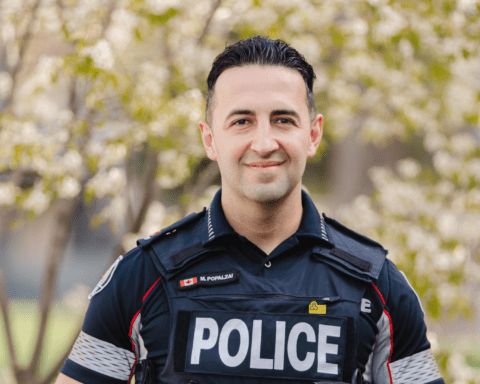There are two words starting with the letter “p” that capture the essence of 2020; pandemic and protest. While the pandemic has been long and decidedly awful for everybody, except maybe Zoom, the different protests that have popped up throughout the year have garnered mixed emotions.
In the last year, we’ve seen protests denouncing the Coastal GasLink Pipeline in B.C., healthcare workers in Alberta battling against cuts and privatization, failed negotiations leading to teachers striking in Ontario, disputes amongst fishers spark protests in Nova Scotia, and numerous Black Lives Matter (BLM) protests in response to the killing of George Floyd. There’s also been a steady stream of anti-mask protests calling for an end to COVID-19-related restrictions across the country. We’ve even seen some pro-Trump rallies, which is deeply concerning considering what the world witnessed at the Capitol Hill riots mere weeks ago.
Everyone has the legal right to protest but not all protests nor the people who attend them are treated equally.
Who’s allowed to protest?
I spoke to a man last month who took issue with the narrative around anti-lockdown protesters like Adam Skelly. He said that Skelly and other anti-mask advocates were vilified for expressing their beliefs and standing up for a cause. He argued that these protesters were attacked (not literally, mind you) in ways that BLM protesters and people protesting in support of Indian farmers weren’t. According to him, people’s disproportionate response to the civic demonstrations stems from the fact that many anti-mask protesters in Canada are white.
View this post on Instagram
The man argued that anti-mask protesters were simply fighting for human rights. Meanwhile, he couldn’t understand why BLM and other protesters weren’t condemned for gathering during a pandemic.
“I don’t understand why these people are protesting about issues that aren’t even happening here,” he said. Not to put words in his mouth but he said something like: Canada is good so you don’t have to worry about things like that here. They should be grateful and stop complaining.
As a white person, it is never my job to tell a Black person, a Latinx person, or an Indigenous Native how to stand against centuries of injustice.
If I complain about *how* that person protests, I’m really saying, “You’re free to speak—just not loud enough to actually be heard.” https://t.co/cyWYOEXD9b— The MaskedMuser (@TheMuserGR) January 19, 2021
I was working in a customer service role at the time and if I responded the way I wanted to I might’ve got fired.
Although it was only the opinion of one grossly-misinformed individual, it tapped into a familiar sentiment. Some people just view protesters as disruptive and ungrateful. They think that protesters don’t deserve to feel aggrieved or have their situations changed. They think that their causes don’t merit sympathy. Or they think that the way people are protesting is antagonistic or outweighs the so-called injustices. This is especially the case when it comes to Indigenous people stating their right to and desire for self-determination. Or any other right, really.
Come on, Canada.
Before you complain about indigenous-lead protests, why don’t you try having to boil all your drinking water for most of your life? Or having your sister go missing and nobody cares? Or having a government do what they want on land you never gave them?
— Amanda Jetté Knox (@MavenOfMayhem) February 9, 2020
The blame game
Blame and entitlement are important factors to consider when thinking about protests. In a protest, essentially, one group feels someone is entitled to something they’re not getting and blames another group for that discrepancy. It’s a power struggle. Who receives blame is telling because it reflects people’s values and who someone thinks is entitled to what. And similarly to negative news stories and stereotypes, when it comes to marginalized people, the blame is placed on the whole group rather than just the perpetrators.
Although it wasn’t a protest, we saw this last year in some reactions to “brown” people gathering for Diwali in Brampton. However, the same condemnation was largely absent when it came to people gathering for Christmas or Thanksgiving.
Remember in November when cases were rising in Brampton and everyone blamed Diwali and brown people for not following public health guidance? Now we’re a few weeks post Christmas, my ICU ran out of beds, we’ve hit record case numbers and… silence. Weird how that works.
— Indy ਸਿੰਘ Sahota (@indysahota) January 18, 2021
In the case of 1492 Land Back Lane in Caledonia where a housing development is encroaching on traditional, decree-protected Haudenosaunee land, many people see the land defenders as the real intruders. The clashes between opposing groups have been violent at times and the whole situation carries the undeniable stench of colonialism. Remember, It’s a privilege to only be inconvenienced by protests and not to be subjected to the inequalities that people are protesting against. It’s a privilege to protest at all considering in some places protesting or freedom of expression is a punishable offense.
Reminder to Canadians watching the US today that white supremacists terrorized the Mi’kmaw fishers less than 3 months ago, and the RCMP also sat around doing nothing.
— Amanda Bartley (@bartleyamandaj) January 6, 2021
Who’s punished?
The consequences of protesting is another important factor. Recall what happened when the eldest son of a family-owned-Syrian restaurant in Toronto attended a protest in Hamilton where well-known white supremacist (or at least affiliate) Maxime Bernier was speaking. Violence broke out at the protest and featured members from opposing sides but the restaurant owner’s son wasn’t involved. However, the family received so many death threats that they almost closed their restaurant out of fear for their safety.
I’m sorry, I can’t seem to write today because I’m too busy watching white supremacists attempt to storm the seat of US government, erect crosses in front of the Capitol, and yet somehow manage to be treated better by the police than Black protesters ever have been.
— Jodi Picoult (@jodipicoult) January 6, 2021
Which protesters are met with violence and which are not, especially from law enforcement, is something we all should consider. Protests featuring BIPOC are more likely to provoke a violent response from police, as we saw in Washington and many times before it. A group of predominantly white would-be-insurrectionists were allowed to move past police and run riot in the house of American democracy, the same place where just months ago law enforcement stood guard armed to the teeth ready to meet BLM protesters. The contrast between how these two events were handled is illustrated perfectly by Global News and CNN.
Style guide note: When a mob storms the legislature in order to shut down the certification of an election in which their side lost, the word "protestor" does not describe its members.
Please consider using "insurrectionist," "terrorist," or, perhaps, "Brownshirt."
— David Moscrop (@David_Moscrop) January 6, 2021
The fact that Trump-supporters were able to make it as far as they did and to leave relatively unscathed speaks to their white privilege. They felt entitled to having the country run the way they see fit and acted accordingly. These were not peaceful protesters fighting for human rights, they’re domestic terrorists who have grievances with facts. I shudder thinking about what the outcomes would’ve been had the mob been made up of BIPOC.
I wish George Floyd was asked nicely. I wish Breonna Taylor was asked nicely. I wish Trayvon Martin was asked nicely. I wish Philando Castile was asked nicely. I wish Eric Garner was asked nicely. I wish Michael Brown was asked nicely. I wish Tamir Rice was asked nicely. I wish.. https://t.co/nqdQe2SHmF
— linda belcher⚜️ (@bourbonbay) January 18, 2021
Protests are tools of the powerless and the oppressed which have been appropriated by people with incredulous amounts of privilege and entitlement, cheapening the purpose and importance of protests.
Marcus is a poet, editor and freelance journalist based in Toronto. He currently works with New Canadian Media as an Editor and as a Freelance Writer for ByBlacks.com, The Edge: A Leader's Magazine and The Soapbox Press.




